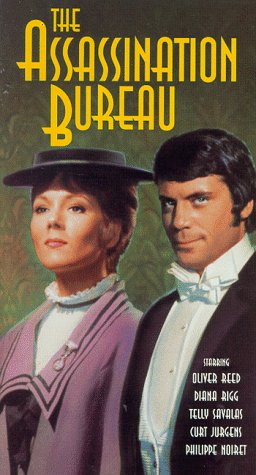
THE ASSASSINATION BUREAU
UK, 1968, 110 minutes, Colour.
Oliver Reed, Diana Rigg, Telly Savalas, Curt Jurgens, Philippe Noiret, Warren Mitchell, Beryl Reid, Clive Revill.
Directed by Basil Dearden.
A lot people will feel that The Assassination Bureau was worthwhile just to keep in touch with Diana Rig; but as a demure suffragette, she doesn't get as much chance for vigorous action and witty remark as we would like, or have come to expect. Edwardian costumes and customs are far too constricting. Nevertheless, she seems to enjoy herself on a grand tour of Europe dodging bombs, guns and drowning. The film also gives us a fantasy postscript to the origins of World War 1 - and it seems strange that Oliver Reed's elegant villain-hero wasn't able to ward off the war as he did all of his death-defying threats. I suppose Lord Bootlick wasn't the only one with the idea of 'assassinating Europe' and that the others were able to organise their bureau more destructively. The Assassination Bureau is that type of fantasy that even adults like to indulge in now and again. 'Wouldn't it be weird and wonderful if' and the resulting plots and counterplots are good for a thrill and a laugh. The present producers indulge a fantasy for bombs and explosions. But it's a pity that the film is not faster-paced; it explains the obvious at times, or tries to get more than the most out of a specially-constructed set.
1. Was this an enjoyable film? How much did the adventure contribute to the success? The comedy. the fantasy? Could this be called an adult fantasy comedy? Why? Was it more for adults than for younger audiences? Why?
2. How Unreal a world did the film portray? How successfully? How much realism was there in the film? The World War 1 background and the elements of truth here? How well did the screenplay blend reality and unreality for its purpose?
3. How attractive was the film as costume drama? The Edwardian setting, the style and manners, the portrayal of London. the continent. Venice. the Zeppelin and Germanic backgrounds? What response do these elicit from audiences?
4. How enjoyable was the film as a spoof of spy dramas? In situation and dialogue? in characters? The parody and irony? The effect of this on audiences?
5. What attitudes towards heroics did the film take? Dragomiloff as hero and villain? Sonia as heroine? The exaggerated and mannered heroics of Edwardian times? Their effect on modern audiences?
6. Comment on the ingenuity of the screenplay - its twists and parody, its use of fear. suspense. the enjoyment of the challenge of killing the hero?
7. Oliver Reed as hero? His portrayal? The character of Dragomiloff and his professional pride in his bureau? The parody of his challenging his members to kill him? The enjoyment of his disguises? The portrayal of his repentance. His awareness of right and wrong? The mock solemnity of his final decoration?
8. The strength of Sonia as a heroine? Diana Rigg’s style? the portrayal of the determined emancipated woman? The independent journalist? Allowing herself to be deceived by Lord Bostwick? Her changing femininity in response to the hero? What touch did her heroic ride at the end. her gallop as a nun. give?
9. Lord Bostwick as a conventional villain? The satire on power hungry Lords? Telly Savalas?
10. Von Pinck and his plans for war, the Zeppelin sequences as humour and as adventure? Spectacular?
11. The attitude of the films to death - the parody in the Parisian brothel. the overtones of Lady L.? The death of the Swiss banker, death in Venice. the death on the trains. the Zeppelin deaths? The irony of the light-hearted attitude and the variety of assassinations? The impact of this black comedy?
12. What audience presuppositions do these films have? How well do they appeal to them? Why are they so enjoyable?